
The Liberal Party was one of the two major political parties in the United Kingdom, along with the Conservative Party, in the 19th and early 20th centuries. Beginning as an alliance of Whigs, free trade–supporting Peelites and reformist Radicals in the 1850s, by the end of the 19th century it had formed four governments under William Gladstone. Despite being divided over the issue of Irish Home Rule, the party returned to government in 1905 and won a landslide victory in the 1906 general election.
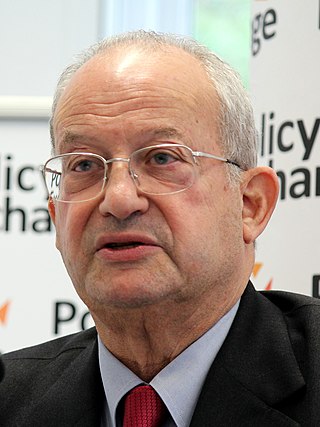
David John Sainsbury, Baron Sainsbury of Turville, is a British politician, businessman and philanthropist. From 1992 to 1997, he served as chairman of Sainsbury's, the supermarket chain established by his great grandfather John James Sainsbury in 1869.

The 1922 United Kingdom general election was held on Wednesday 15 November 1922. It was won by the Conservative Party, led by Bonar Law, which gained an overall majority over the Labour Party, led by J. R. Clynes, and a divided Liberal Party.
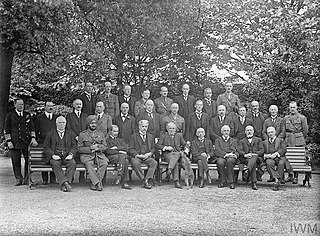
Liberal David Lloyd George formed a coalition government in the United Kingdom in December 1916, and was appointed Prime Minister of the United Kingdom by King George V. It replaced the earlier wartime coalition under H. H. Asquith, which had been held responsible for losses during the Great War. Those Liberals who continued to support Asquith served as the Official Opposition. The government continued in power after the end of the war in 1918, though Lloyd George was increasingly reliant on the Conservatives for support. After several scandals including allegations of the sale of honours, the Conservatives withdrew their support after a meeting at the Carlton Club in 1922, and Bonar Law formed a government.
Alexander Bernstein, Baron Bernstein of Craigweil was a British television executive and a Labour member of the House of Lords.
Labour Friends of Israel (LFI) is a group in the Parliament of the United Kingdom that promotes support for a strong bilateral relationship between Britain and Israel, and seeks to strengthen ties between the British Labour Party and the Israeli Labor Party. LFI says it supports a two-state solution to the Israeli–Palestinian conflict, with Israel recognised and secure within its borders, and the establishment of a viable Palestinian state. As of July 2020, it comprises around one quarter of the Parliamentary Labour Party and one third of the Shadow Cabinet.

The Cash-for-Honours scandal was a political scandal in the United Kingdom in 2006 and 2007 concerning the connection between political donations and the award of life peerages. A loophole in electoral law in the United Kingdom means that although anyone donating even small sums of money to a political party has to declare this as a matter of public record, those loaning money at commercial rates of interest did not have to make a public declaration.

Robert Gavron, Baron Gavron was a British printing millionaire, philanthropist and a Labour life peer.
Sir Emmanuel Kaye was a millionaire British industrialist and philanthropist known for founding Lansing Bagnall.
The BBC Trust was the governing body of the British Broadcasting Corporation (BBC) between 2007 and 2017. It was operationally independent of BBC management and external bodies, and its stated aim was to make decisions in the best interests of licence-fee payers. On 12 May 2016, it was announced in the House of Commons that, under the next royal charter, the regulatory functions of the BBC Trust were to be transferred to Ofcom.
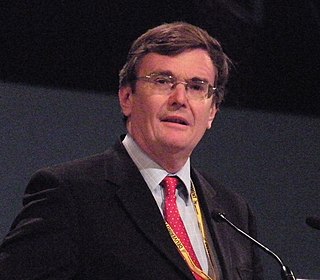
Matthew Alan Oakeshott, Baron Oakeshott of Seagrove Bay, is a British investment manager and member of the House of Lords, formerly sitting in Parliament as a Liberal Democrat.
The National Government of August–October 1931, also known as the First National Government, was the first of a series of national governments formed during the Great Depression in the United Kingdom. It was formed by Ramsay MacDonald as Prime Minister of the United Kingdom following the collapse of the previous minority government, led by the Labour Party, known as the Second MacDonald ministry.

The Liberal government of the United Kingdom of Great Britain and Ireland that began in 1905 and ended in 1915 consisted of two ministries: the first led by Henry Campbell-Bannerman and the final three by H. H. Asquith.
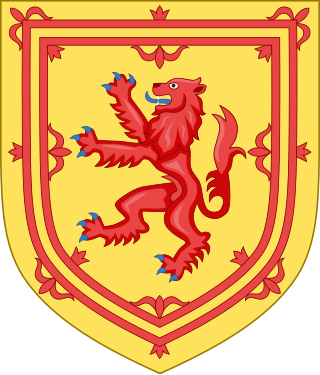
The Commission on Scottish Devolution, also referred to as the Calman Commission or the Scottish Parliament Commission or Review, was established by an opposition Labour Party motion passed by the Scottish Parliament on 6 December 2007, with the support of the Conservatives and Liberal Democrats. The governing Scottish National Party opposed the creation of the commission.
Sir William Edge, 1st Baronet was a British Liberal, later National Liberal, politician and businessman.
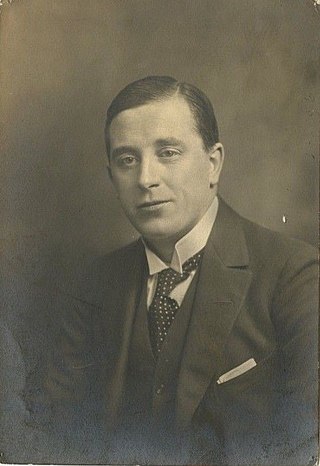
Sir William Sutherland, KCB, PC was a Scottish civil servant, Liberal Party politician and colliery owner. He was closely associated with Prime Minister David Lloyd George serving as his private and press secretary and later as his Parliamentary Private Secretary. He was one of Lloyd George's go-betweens in the sale of honours for the Lloyd George Fund. In his dealings with the press he would certainly have been labelled a spin doctor if that phrase had had currency in the early twentieth century, indeed he has recently been described as "the first of the modern spin doctors".
Political funding in the United Kingdom has been a source of controversy for many years. Political parties in the UK may be funded through membership fees, party donations or through state funding, the latter of which is reserved for administrative costs. The general restrictions in the UK were held in Bowman v United Kingdom to be fully compatible with the European Convention on Human Rights, article 10.
The 1928 Lancaster by-election was a parliamentary by-election held in England for the House of Commons constituency of Lancaster on 9 February 1928.
For the American architect, see David Osler (architect).

Michael John Wade OBE is a British insurance executive and political advisor.











